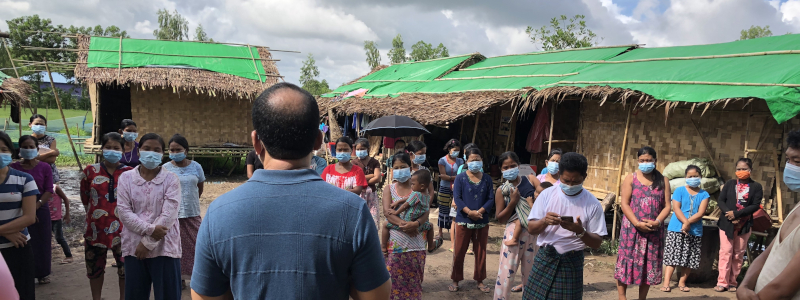Police in Laos recently summoned the residents of six villages to make this announcement:
“Since Christianity is a Western religion, any child under the age of 17 is not allowed to believe in Jesus.”
Saying Christians are low-class people and that non-Christians are wealthier, the officers asserted that there is no advantage to being a Christian. The leader of a native ministry said officers then went to the homes of Christians and burned or threw away any crosses they found.
“They later made a threat that if they found any Christians gathered in groups of five people or more, they would be nailed by their hands and feet, and then shot to death,” the leader said. “The police became so annoyed at the Christians in these villages that they even went to the churches and forced the pastors to give them all the names of youths under the age of 17, and then ordered that their names be removed from the church records.”
A 14-year-old boy in one of the villages, however, continued attending worship services and serving his church, the leader said. Police went to the boy’s school and took him away in handcuffs.
“The police let him go, but not before telling him that if he attended church again, he would be thrown into prison.”
“While questioning him at the police station, they threatened him about attending church and tried to force him to renounce his faith,” the leader said. “Eventually the police let him go, but not before telling him that if he attended church again, the penalty would be more than handcuffs – he would be thrown into prison.”
The boy returned home deeply shaken, but his father encouraged him not to be afraid of evil but remain firm in faith, the leader said. A local missionary heard what had happened and rushed to the boy’s home to encourage him and his family.
Standing Up to Bullies
The local police’s actions blatantly contravene constitutional provisions for religious freedom in Laos, where the government officially recognizes the Laos Evangelical Church, the Seventh-day Adventist Church and the Catholic Church.
The strong-arm tactics also violate the U.N. International Covenant on Civil and Political Rights, ratified by Laos in 2009, which upholds the right to adopt a religion/belief of choice as well as the right to manifest that religion/belief in a corporate worship (Article 18).
“One of our team leaders has been really bold in defending these Christians when local authorities come to harass them,” the ministry leader said. “At times we fear for this leader, because he is quite blunt with the authorities, stating that Christianity is legally recognized by the government as one of the official religions that Laotians can believe in.”
The team leader has brought Christians together for seminars that have been a great encouragement for persecuted believers, the ministry director said.
“These seminars have become a safe haven for persecuted Christians to gather for prayer, sharing hardships and spiritual blessing,” he said. “It is so crucial to have leaders and follow-up team members that help and encourage believers in these situations.”
House churches lacking administrative approval are considered illegal in Laos. While fewer Christians in Laos were arrested in 2021 compared with 2020, more converts were driven from their homes by villagers opposed to their faith, according to Open Doors’ 2022 World Watch List report.
“The brunt of persecution is reserved for converts to Christianity, who are deemed guilty of betraying the Buddhist-animist traditions of their community,” the report states. “They frequently face pressure and violence from their families and the local authorities, both of whom will stir up opposition from the local community or religious leaders. This can lead to converts being expelled from the village.”
Laos ranked 26th on the World Watch List of the 50 countries where it is most difficult to be a Christian. In the officially atheistic, communist country, about 60 percent of the population is Buddhist and 32 percent animist, though animism also permeates many of the Buddhists’ beliefs and practices. Still, people are coming to Christ in spite of strong cultural barriers and opposition.
“In spite of not being able to meet physically with our ministry team for almost two years, the work inside Laos is growing, and many are coming to faith in Christ,” the local ministry leader said. “Many are listening to our radio programs that are broadcast from powerful shortwave stations and also on Facebook.”
Workers are distributing USB drives loaded with gospel messages to churches, providing discipleship material for small groups or Sunday sermons. With COVID-19 restricting some travel, these materials are deeply appreciated, as are printed materials; workers recently printed and distributed 3,030 Bible lessons in the Lao language.
“Despite regional restrictions in travel, and constant threats from local authorities, our follow-up teams have been faithful in connecting with our listeners and shepherding those that want to learn more and grow in their spiritual life,” the ministry leader said. “Now many people groups have sought the guidance and leadership of our Khmu leaders. This is especially true when village heads persecute those who are Christians.”
Local missionaries are aiding the persecuted and forming disciples throughout the country. Please consider a donation today to equip and encourage them for the task.

